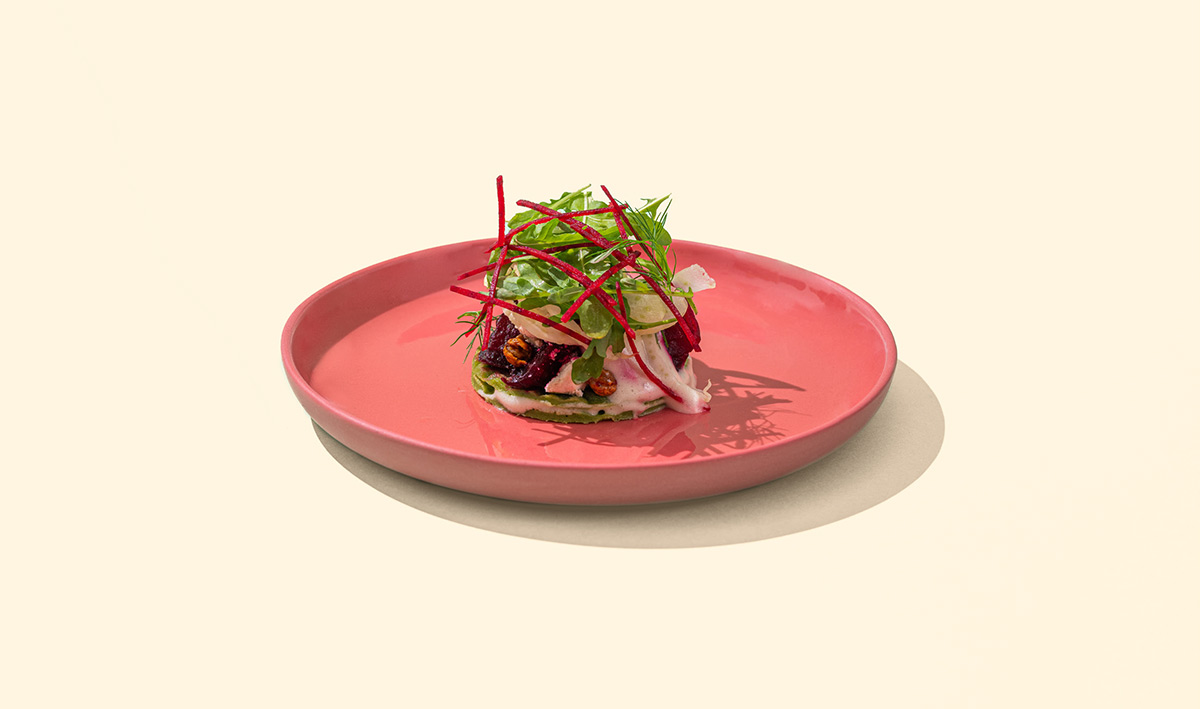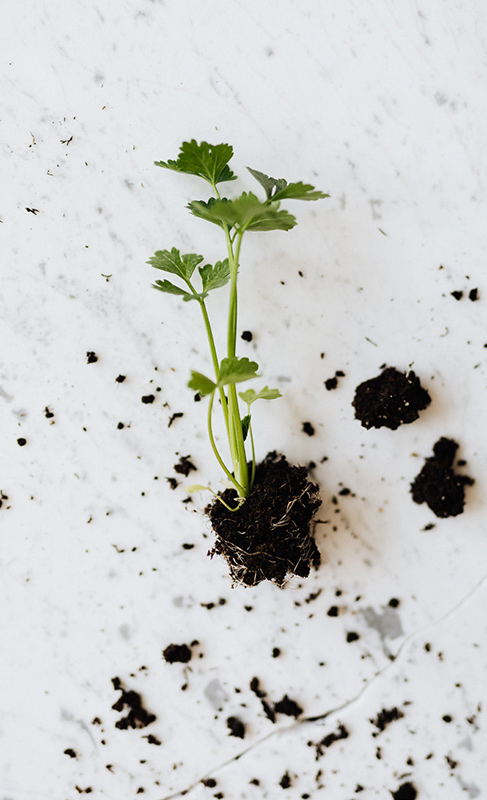For January, our monthly contributor and wellness mentor Victoria Kruse had the opportunity to explore the world of plant-based cuisines with Chef Kirk and his sister Keeley Haworth, founders of Plates London.
Victoria is based in the Maldives, and the duo from London visited her resort to create five-course menus and host a master class for the lucky guests. Kirk studied cooking with many Michelin-starred chefs, including his own father, Nigel Haworth. He and his sister joined Victoria in a foraging experience, collecting food from the resort’s vegetable gardens and cooking the bounty together for an enjoyable lunch. Meanwhile, Victoria quizzed Kirk about the challenges and joys of plant-based cooking.
Victoria – You care to call your amazing food plant-based and not vegan. Can you define what you see as the difference between these terms?
Kirk – Plant-based has always felt the correct definition for us at Plates as it better describes the space we create in and feels more inclusive for our different audiences that are not all vegans. Veganism can mean more than just the food. It’s a lifestyle often involving choices that go beyond food and drink.
Victoria – Is the vegan diet inherently healthier than other ways of eating? And do you think it’s right for everyone?
Kirk – There can be an unhealthy approach to all food genres, so I don’t think being vegan is healthier by default. However, when done right, eating a vegan diet is beneficial, but it needs to be researched and [if you’re new to it] well planned out to give you all your body needs. It does take extra effort to include all nutrients in a vegan diet and keep it interesting, but the rewards are plenty. Diet is personal and unique, so I can’t say it’s right for everyone. Being a healthy vegan takes passion and effort. I believe what is good for everyone, is starting to incorporate more hearty plantbased meals and days into your diet and more people realising these wonders for themselves and the planet.
Victoria – What are your three favourite plants to cook with?
Kirk – Beetroots, artichokes and onions.
Victoria – What was the single hardest non-plant food that you gave up?
Kirk – I’d say shellfish – scallops particularly, they were my favourites.
Victoria – Why do you think that plant-based [vegan] eating is gaining such popularity?
Kirk – I think because people are caring for the planet and nature a lot more. They’re equally aware of the importance of taking care of their own health [mind and body] and overall well-being. These things all work together holistically, and it’s driving the popularity of plant-based as a genre and vegan as a way of life.
This year, get inspired to embrace a healthier lifestyle with Kirk Haworth’s plant-based dish Herbaceous Pancake with pickled beetroot and chickpea aioli.
 Herbaceous Pancake
Herbaceous Pancake
(makes six)
Ingredients:
100g gluten-free plain flour
10g chickpea flour
1tsp bicarbonate of soda
10g fresh parsley
10g rocket leaves
2g fine salt
1tbsp olive oil
200ml water
Method:
Add all the ingredients into a food processor until green and smooth, about two minutes. Pour the content into a medium-sized mixing bowl. Put a non-stick frying pan on high heat and, using a pastry brush, lightly coat the pan with sunflower oil, add one small ladle full of the mixture to the hot pan and cook for around one to two minutes. Using a flexible spatula from the outside of the pancake, work your way around and gently flip onto the other side. Cook for another one to two minutes, turning down the heat by half.
Take the pancake out of the pan gently onto a tray lined with parchment paper. Allow to cool, then using the largest sized cutter, cut out a nice clean circle and store the pancakes in the fridge in an airtight container lined with parchment paper.
Baked and Pickled Beetroot
(serves six)
Ingredients:
2 large beetroots
1 tbsp olive oil
2 sprigs fresh thyme
1 pinch salt
100ml apple cider vinega
Method:
Preheat the oven to 190° Celsius or alternatively use a barbecue grill.
Cut out a square of parchment paper and tin foil – 25cm by 25cm.
Place the beetroot in the centre of the parchment paper with the tin foil underneath.
Add the oil, thyme and a pinch of salt to the beetroot and wrap tightly in the foil.
Put in the oven and roast for around one hour. Take out of the oven, and with a small knife, pierce the beetroot to check if it is tender. The knife should go through the beetroot with ease.
Allow cooling at room temperature for around one hour. Using gloves, peel the beetroot skin off with your hands; this should peel easily whilst the beetroot is still warm (do not put it in the fridge until skin is peeled). Using your hands, naturally break the beetroot into random sized chunks around two by two centimetres.
Thinly slice the half of a raw beetroot and dress with the apple cider vinegar, pinch of salt and olive oil for the pickled version.
Chickpea Mayo
(serves six)
Ingredients:
80ml aquafaba (chickpea water)
100ml sunflower oil
60ml olive oil
1 clove roast garlic pureed
1tbsp lemon juice
1tsp apple cider vinegar
¼tsp xanthan gum
salt
Method:
Place the aquafaba in a kitchen aid bowl, add the xanthan gum and garlic.
Start to whip up using a whisk until it starts to come to a soft peak, then slowly begin adding both oils as you would in a mayonnaise.
Once all oil is added slowly and it is at a mayonnaise-like texture, firm but light, add all of the remaining ingredients with a pinch of salt to taste, and then store in a squeezy bottle.
Wash the chickpeas left in the can, dry them at 46° Celsius overnight, and store them in an airtight container.
Victoria’s top tip for 2022:
Take some time to stop and listen to your body when you ’feed’ it. Your body [not mind] knows what is good for it, so look inside and take note of what makes you feel truly good.




